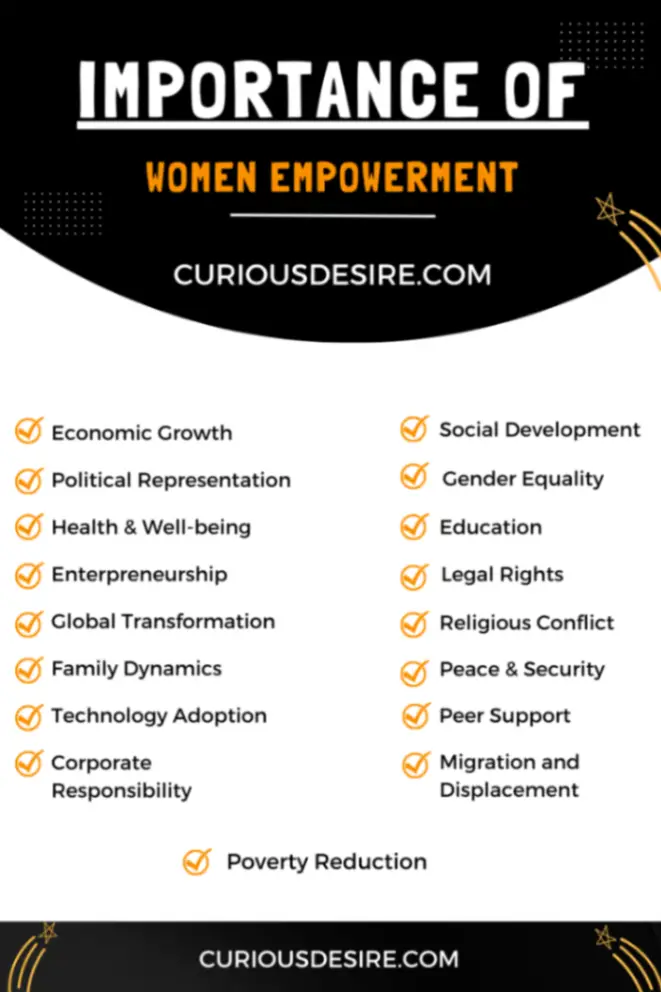In today’s world, the empowerment of women is more important than ever.
The impact of empowering women goes far beyond just gender equality – it has the potential to transform societies, economies, and the world as a whole.
Women’s empowerment is not just a moral imperative, but also a strategic one, as it unlocks the full potential of half of the world’s population.
In this blog, we delve into the profound importance of women’s empowerment and why it’s not just a matter of rights, but a catalyst for global prosperity.
5 most effective reasons for the importance of women empowerment:
- Economic Growth
- Political Representation
- Social Development
- Family Dynamics
- Peace and Security

1. Economic Growth
Women’s empowerment is crucial for economic growth on both a micro and macro level.
When women are empowered with equal access to education, employment opportunities, and resources, they contribute significantly to the economy.
Studies have shown that investing in women’s economic empowerment leads to increased productivity, GDP growth, and poverty reduction.
By providing women with access to education, financial resources, and opportunities for entrepreneurship, societies unlock a powerful engine for sustainable development.
Countries can unleash their complete economic potential by bridging the gender gap in the workforce.
2. Social Development
Women’s empowerment leads to social development by breaking cycles of poverty and improving overall well-being.
Empowered women are more likely to invest in their families’ health, education, and nutrition, leading to better outcomes for future generations.
Moreover, empowered women are more likely to engage in community development initiatives, leading to inclusive and sustainable progress.
By empowering women with equal rights, opportunities, and access to resources, societies can create a more equitable and just environment where both men and women can thrive.
3. Political Representation
Women’s empowerment is essential for achieving gender parity in political representation.
When women participate in politics and hold positions of leadership, they bring diverse perspectives, priorities, and solutions to the table.
Increasing the representation of women in politics leads to better governance and more responsive policies that benefit all members of society.
Political empowerment of women is crucial for fostering inclusive governance and decision-making processes.
4. Gender Equality
Women’s empowerment is essential for achieving gender equality, ensuring that women have the same rights, opportunities, and voice as men in all spheres of life.
By empowering women to have control over their bodies, finances, and life choices, societies can combat gender-based discrimination and violence.
Achieving gender equality means breaking down barriers that prevent women from accessing these opportunities and ensuring they have equal chances to succeed.

5. Education
Women’s empowerment plays a crucial role in promoting education, both for women and for society as a whole.
When women are empowered through education:
- They gain knowledge and skills that enable them to make informed decisions about their lives, families, and communities.
- They are more likely to pursue higher education and professional opportunities, leading to personal fulfillment and economic independence.
- Educated women often prioritize their children’s education, leading to improved educational outcomes for future generations.
- Empowered women contribute to a more educated and skilled workforce, driving innovation, productivity, and economic growth.
6. Health and Well-being
Women’s empowerment plays a critical role in improving overall health and well-being outcomes.
Empowered women have better access to healthcare services, information, and resources to make informed choices about their health.
By empowering women to take control of their well-being, societies can achieve better health outcomes for all members, leading to a healthier and more resilient population.
They have greater control over their reproductive health, including family planning decisions, leading to lower maternal mortality rates and improved child health.
Women’s empowerment contributes to mental health and emotional well-being by reducing stress, anxiety, and depression associated with gender discrimination and social exclusion.
7. Entrepreneurship and Innovation
Women empowerment drives entrepreneurship and innovation by unlocking untapped potential and creativity.
When women are empowered to start and grow businesses, they contribute to job creation, economic diversification, and innovation in various sectors.
Empowered women bring diverse perspectives, creativity, and problem-solving skills to entrepreneurial ventures, leading to innovation and market competitiveness.
Women-owned businesses often prioritize social and environmental sustainability, driving inclusive and environmentally responsible economic development.
Women entrepreneurs serve as role models and mentors, inspiring future generations of women to pursue their entrepreneurial aspirations and contribute to economic prosperity.
8. Legal Rights and Justice
Women’s empowerment is closely linked to ensuring legal rights and access to justice for women and girls.
- Ending Gender-Based Violence: Empowering women involves combating gender-based violence and ensuring survivors have access to legal recourse and support services. Legal mechanisms such as protection orders, prosecution of perpetrators, and specialized courts for gender-based violence cases are essential for addressing this issue.
- Reproductive Rights: Women’s empowerment includes the right to make autonomous decisions about reproductive health, including access to contraception, abortion services, and maternal healthcare. Legal protections are needed to safeguard reproductive rights and ensure women’s access to comprehensive reproductive healthcare services.
- Property and Inheritance Rights: Women’s empowerment requires legal recognition of women’s property and inheritance rights. Many women face discrimination in property ownership and inheritance, depriving them of economic autonomy and perpetuating gender inequality. Legal reforms are needed to ensure women have equal rights to land, property, and inheritance.
9. Cultural Transformation
Women’s empowerment is essential for driving cultural transformation towards gender equality and respect for women’s rights.
Cultural norms and stereotypes often limit women’s opportunities and reinforce gender roles that prioritize men’s authority and women’s subordination.
Cultural transformation involves promoting positive representations of women and girls in media, arts, and popular culture.
By challenging negative stereotypes and showcasing women’s achievements, talents, and contributions, cultural industries can play a powerful role in shaping attitudes and perceptions about gender
10. Global Development
Women empowerment is a key driver of global development and sustainability.
Empowering women to participate fully in economic, social, and political life is essential for achieving the Sustainable Development Goals and building a more inclusive and equitable world.
By investing in women’s empowerment globally, we can create a more prosperous, peaceful, and sustainable future for all.
Women’s empowerment requires global partnerships and cooperation to address systemic barriers and challenges.
International organizations, governments, civil society, and the private sector must work together to promote gender equality, protect women’s rights, and advance women’s empowerment as a key priority for global development.
11. Financial Independence
Financial independence is essential for women’s empowerment as it allows them to exercise autonomy, make decisions, and have control over their lives.
When women have access to economic resources and opportunities, they can pursue their goals, support themselves and their families, and contribute to economic growth.
Financial independence reduces vulnerability to poverty, exploitation, and abuse, enabling women to break free from cycles of dependency and inequality.
It empowers women to invest in education, healthcare, and entrepreneurship, fostering resilience and well-being for themselves and future generations.
12. Family Dynamics
Women’s empowerment transforms family dynamics by promoting equality, respect, and cooperation among family members.
- Shared Responsibilities: Empowered women advocate for shared responsibilities and decision-making within families, challenging traditional gender roles that prioritize men’s authority and women’s subordination.
- Parenting Practices: Empowered women play active roles in parenting and child-rearing, promoting positive parenting practices, communication skills, and emotional support within families.
- Intergenerational Dynamics: Women’s empowerment influences intergenerational dynamics by breaking cycles of poverty, inequality, and discrimination. Empowered women invest in their children’s education, health, and well-being, providing them with opportunities for social mobility and advancement.
- Healthy Relationships: Empowered women cultivate healthy and respectful relationships with their partners, children, and extended family members.
13. Peace and Security
Peace and security are fundamental to women’s empowerment, particularly in conflict-affected areas where women often bear the brunt of violence and displacement.
When women are empowered to participate in peacebuilding and conflict resolution efforts, they bring unique perspectives, skills, and experiences that contribute to sustainable peace and reconciliation.
Women’s involvement in decision-making processes ensures that peace agreements address the needs and rights of all individuals, promoting inclusivity and social cohesion.
By addressing the root causes of conflict and addressing gender-based violence, societies can create environments where women feel safe, valued, and empowered to rebuild their lives.
14. Technology Adoption
Technology adoption is a powerful tool for women’s empowerment, expanding access to information, resources, and opportunities.
When women have access to technology, they can overcome barriers of geography, language, and socio-economic status, connecting with peers, mentors, and markets around the world.
Technology enables women to access educational content, skills training, and entrepreneurial support, empowering them to acquire new skills, pursue economic opportunities, and achieve financial independence.
Digital platforms provide women with spaces for advocacy, collaboration, and support, fostering solidarity and collective action for gender equality and social change.
15. Peer Support
Peer Support is a fundamental aspect of women’s empowerment as it provides a sense of belonging, validation, and shared experiences.
When women come together to support each other, they create safe spaces where they can share challenges, successes, and aspirations without fear of judgment or discrimination.
Peer support networks offer emotional support, practical advice, and encouragement, empowering women to navigate obstacles, overcome barriers, and achieve their goals.
By connecting with peers who share similar experiences and struggles, women build resilience, confidence, and a sense of community, reinforcing the notion that they are not alone in their journey toward empowerment.
16. Corporate Responsibility
Empowering women within corporate settings is integral for fostering diversity and inclusion, which in turn drives innovation and creativity.
By providing equal opportunities for women in leadership positions, companies can leverage a wider range of perspectives and talents, leading to more effective decision-making and problem-solving.
When women feel valued and supported in their careers, they are more likely to remain with the company long-term, reducing turnover costs and ensuring continuity in organizational knowledge and expertise.
Promoting gender diversity and empowerment within corporations helps mitigate risks associated with gender discrimination and harassment

17. Media Representation
The media plays a significant role in shaping societal perceptions and attitudes towards women.
Empowering women through media representation involves challenging stereotypes and promoting diverse and positive portrayals of women in various forms of media, including film, television, advertising, and news.
By showcasing women in diverse roles and occupations, media representation helps break down gender stereotypes and promotes the idea that women are capable of achieving success in any field.
Positive representations of empowered women in the media can have a profound impact on viewers, particularly young girls.
Seeing characters and role models who look like them and achieve success can boost their self-esteem and aspirations, encouraging them to pursue their goals without limitations.
18. Youth Development
Empowering young women through youth development programs is essential for their personal growth, education, and future success.
These programs provide opportunities for young women to acquire essential skills, develop leadership abilities, and engage in civic activities, laying the foundation for their active participation in society.
Empowering young women breaks the cycle of poverty by providing them with the tools and opportunities to pursue higher education and secure gainful employment.
This improves their economic prospects and benefits their families and communities, leading to greater social and economic development.
Furthermore, youth development programs promote health and well-being among young women by providing access to reproductive health services, information on gender-based violence prevention, and support for mental health and resilience.
19. Poverty Reduction
Empowering women has a direct impact on poverty reduction.
Women make up a significant portion of the world’s poor population, and addressing gender disparities can help alleviate poverty in several ways:
- Economic Empowerment: When women have access to education, skills training, and economic opportunities, they can contribute to household income and economic growth. This improves their financial situation and benefits their families and communities.
- Health and Well-being: Empowering women regarding healthcare access and information can improve maternal and child health, leading to better family outcomes.
- Decision-Making Power: Empowering women to participate in decision-making processes at all levels can lead to policies that address poverty more effectively. Women bring unique perspectives and priorities to the table, which can result in more inclusive and sustainable solutions.
20. Migration and Displacement
Women often face specific challenges and vulnerabilities when migrating, and ensuring their empowerment can make a significant difference.
Empowering women with information, resources, and skills can help them make informed migration decisions, reducing the risks of exploitation and violence.
Providing women with economic opportunities in their home countries can reduce the need for migration due to a lack of livelihood options.
Empowering migrant women in host countries can facilitate their integration into society. This includes access to education, healthcare, legal support, and employment opportunities.
Empowering women with knowledge of their rights and access to support services can protect them from exploitation, trafficking, and other forms of abuse during the migration process.
Conclusion
The importance of women’s empowerment cannot be overstated.
Empowering women is essential for achieving gender equality, driving economic growth, and building a more just and inclusive society.
Women are not just beneficiaries of empowerment – they are agents of change, capable of transforming the world around them.
It is time to unleash the full potential of women and harness their power to create a better world for all.